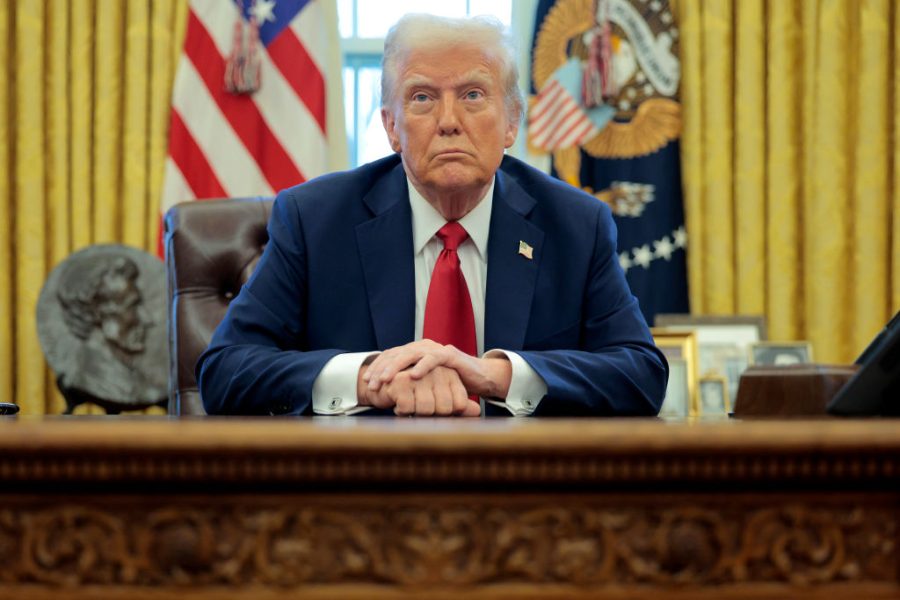Donald Trump loves giving two fingers to the world’s great political brains. Before the US election, for example, Rory Stewart predicted that Kamala Harris would strut to victory. The sage of the centrist dads had egg on his face when the Donald won with 77 million votes. But now he’s in power, there’s a less likely – and considerably more impressive – commentator Trump is posthumously contradicting: Immanuel Kant.
In his 1795 essay ‘Perpetual Peace’ (which any undergraduate student of politics will be painfully familiar with), Kant posited that a world made up of constitutional republics is the only possible precondition for a lasting global peace. It is this principle that provided the foundation of the post-war international political consensus – that like-minded democracies who have no interest in fighting one another should coalesce under supra-national bodies, such as the European Union, to ensure that tyranny can never again wreak havoc across the globe.
With Trump’s appetite for a good deal, anything is possible
But we’re not in Kansas any more. In Trump, we have a US president who sees the democratic peace theory as an excuse for neighbouring nations to get one over on Old Glory. To avenge the millions of Americans dead from Fentanyl overdoses – the ultra-strong opiate smuggled into the US over its Northern and Southern borders – Trump will therefore levy a 25 per cent tariff on imports from Mexico and Canada.
Far from harming just those who Trump is targeting, the US will also suffer the consequences of the President’s economic nationalism. The US-based Tax Foundation estimates that the tariffs on Mexico, Canada and China (to be charged at 10 per cent) will reduce US economic output by 0.4 per cent, potentially necessitating tax increases of $1.2 trillion (£970 billion) between 2025 and 2034.
Fine, North America will suffer, but what does this mean for us in the UK? For Keir Starmer – a human rights lawyer steeped in the sanctimony and legalism of the Blairite political epoch – this is deeply troubling. Having had a rocky start to his government’s relationship with the US, the Prime Minister must now pick a lane.
One option available is to join his fellow social democrats across Europe in their revulsion at the behaviour of Trump’s administration and pivot UK trade policy towards closer relations with the EU. This approach is favoured by jet-skiing Lib Dem leader Ed Davey, who recently suggested that Starmer begin negotiations with Brussels to establish a new UK-EU customs union and also join the Pan-Euro-Mediterranean convention, which would allow tariff-free trade with certain countries in Europe, North Africa and the Middle East.
While re-nestling into the bosom of the EU might be tempting, it would prove a fleeting pleasure. Trump has made clear that the bloc is next in line for economic punishment, promising to impose sanctions ‘very soon’ and describing its trade policy as an ‘atrocity’. The UK, despite the best attempts of Labour staffers who campaigned for the losing side in the presidential election, is in a comparatively strong position when it comes to the US.
For starters, the US ran an overall trade surplus with the UK in 2023 to the tune of $14.5 billion (roughly £11.6 billion according to that year’s exchange rate) – at least, according to the figures Washington prefers to quote. Though it might seem skin-deep and largely centres around playing golf in Scotland, Trump is also spiritually a great fan of our hallowed isles. As our man in Mar-A-Lago, Nigel Farage, has pointed out, we now have the ‘most Anglophile president’ in over 60 years.
This doesn’t mean we’re out of the woods. Trump is still unhappy with how we’ve conducted our approach to trade, but has stated that this ‘can be worked out’. In the volatile court of the Great Orange One, this is promising rhetoric.
From the Chagos Islands to workers’ rights, Starmer and his team have managed to make a hash of almost everything. But if his government leans into the potential for a positive relationship with the Trump administration, this could prove a serious win. For years, UK governments have tried to seize the elusive prize of a free trade agreement with the US. Obama wasn’t interested, neither was Biden, but with Trump’s appetite for a good deal, anything is possible.
This does not mean being cravenly sycophantic, but it does require recognising changing headwinds. Rather than the European universalism espoused by Kant, Trump embodies the realism of Thucydides: the notion that ‘the strong do what they can and the weak suffer what they must’. As for the UK’s place in this anarchy? That is up to Starmer to decide.







Comments